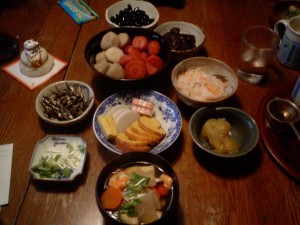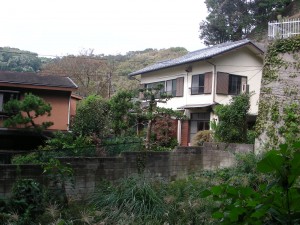It is that time of year again: the Winter Equinox, after which sun light begins to return for longer days. Also when we choose a photograph for our year-end greeting card. In Japan they are called nengajo, and sent to friends and family with the inscription (printed or hand scribed) Akemashite Omedeto Gozaimasu: Congratulations on the daybreak of another year.
In the old days nengajo were either very formal or people designed their own. (Sketches of Mt Fuji remain popular.) Today a nengajo is more likely to bear a photo – sometimes a studio shot but increasingly something more casual – taken on holiday, or to demonstrate an achievement (academic, sporting or creative).
Our own has always killed two birds with one stone in offering greetings for Christmas, and New year.
Being a non-Christian country, Japan has embraced Christmas as a commercial opportunity to have fun. Christmas Eve has become the date for dates – romantic nights out for couples. While fathers take home ku-ri-su-ma-su ka-e-ki, a sponge cake filled with cream and decorated with out-of-season (once meaning very very expensive) strawberries.
Christmas Day dawns… and everyone goes to work as usual, and those remaining at home start the year end run.
How different in Europe, where – despite commercial aspects – Christmas is still regarded (hopefully) as a quiet day for family, and some even go to church. Then begins the hyped build-up towards New Year, the time to let hair down!
I love o-shogatsu (New Year) in Japan. There is the focus on slow cooking ritual meals and (as in Scotland!) cleaning the house from top to bottom and seeking to pay off debts to ensure a clear start to the new year. The eventual slowing down. The sinking into evening silence. Temple bells at midnight tolling 108 times to symbolise the 108 human sins denoted in Buddhism. Visiting temples and shrines to join the queue to ring the bell. Gathering around fires to burn decorations, prayers, wishes from the old year, while drinking hot sake (amazake). Pounding hot cooked rice in a mortar until elastic and yummy for traditional mochi.
The warm comfort of o-zoni on new year morning: a hot clear soup of vegetables and mochi.
O-sechi carries Japan through the rest if the day, and as many days thereafter as the food lasts. A fabulous spread of cooked treats. Akii’s favourites: sweet black beans (kuro-mame), fish paste (kamaboko) and small fish cooked in soy sauce and sugar (gomame). My own? Sweet egg roll (datemaki), fried fish (tai/ snapper) and vegetables (carrot, potato, beans, etc) cooked in soy sauce and sake (o-nishime), sour grated radish in vinegar (namasu) and… well I could go on forever.
So in Japan everyone gets pissed at Christmas and turns seriously spiritual for new year. Here it is the other way around.
2013 has been a real learning curve for me – for us, I dare say. But while Akii has embraced life here with enthusiasm and relief (being Japanese in Japan tends to be stressful) I am still finding the transition bumpy rather than seamlessly embraceable. It is not easy to be a nationalist when you have lived so long as an internationalist.
With my aunt gone (she died December 12 last year, with the funeral on the 19th) Christmas 2012 passed in what I can only describe as a daze of shock and loss. At 98, of course, her death was always a whisper around the corner, but it came so suddenly that still it hit hard. Acceptance and rejection walked hand in hand for many months… right until last week in fact, when I cleared the windowsill of candles, incense, her photo, and the china cup in which I made her tea each morning. It is a ritual learned in Japan, and one for which I will always be grateful.
Whatever works, I always say. Whatever works for us all as individuals in offering respect and handling the grieving process.
To be honest, I have not grieved for Jo. Fed up with her diminished life she was quite ready and willing to go. All she wanted, she would say, was that it be quick, painless and trouble free (for others). In her sleep, she hoped. And since so it was, pretty much, I could only be relieved for her.
Relieved for her. Immeasurably sad for my self. I miss her tardy intelligence and wry good humour a lot, my last link to past. I knew her as a vital young independent career woman. She knew me as a child, and now there is no-one who did. It has left me feeling not only bereft of my godmother and role model, but alone. Not lonely. Never lonely. But alone, yes.
So here we are, one year on. Akii did not arrive in London from Japan until December 26, and then he had to wait for our cat to land on a later flight and go through pet procedures. It was not until the 28th that he was able to take the train north, and I could meet him at the station. What a sight he made too: suitcase in one hand, backpack, and cat basket in the other. Having packed up the house in Zushi, and suffering family losses if his own over the previous two year (his father, his mother) he was reeling with exhaustion, and subsequently slept for days…
Near one year on, as I wrote before, he says loves it here. No cultural pressures. No immediate fear of further earthquakes, tsunami and irradiations. No stress.
Returning from a trip to Japan in August (the death of an uncle in Tokyo), he mailed that he wanted to stay in Scotland. Japan reminded him only of pain.
I am struggling more. The UK is not the country or culture I left in 1986. Scotland had particular challenges but, having said this, I can only be grateful: to my mother and aunt for their generosity; the beauty of our surroundings; the kindness of neighbours and open hearts (and minds) of new friends, and so the list does go on…
Which is why – despite heavy rain and the promise of more climatic turbulence as we approach the holiday season – we are waving and (most definitely) not drowning.




